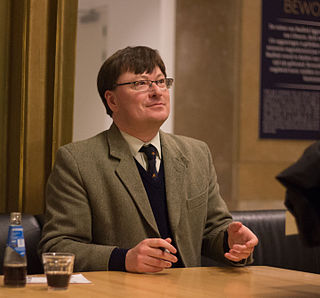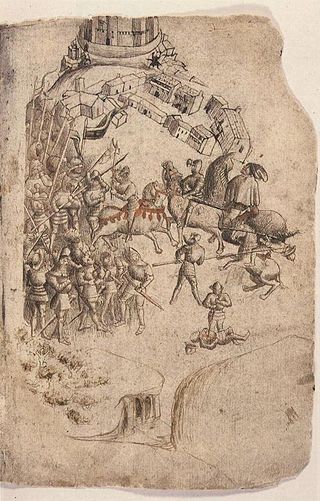Related Research Articles

In the history of Europe, the Middle Ages or medieval period lasted approximately from the 5th to the late 15th centuries, similarly to the Post-classical period of global history. It began with the fall of the Western Roman Empire and transitioned into the Renaissance and the Age of Discovery. The Middle Ages is the middle period of the three traditional divisions of Western history: classical antiquity, the medieval period, and the modern period. The medieval period is itself subdivided into the Early, High, and Late Middle Ages.

Adrian Keith Goldsworthy is a British historian and novelist who specialises in ancient Roman history.

The repeating crossbow, also known as the repeater crossbow, and the Zhuge crossbow due to its association with the Three Kingdoms-era strategist Zhuge Liang (181–234 AD), is a crossbow invented during the Warring States period in China that combined the bow spanning, bolt placing, and shooting actions into one motion.

William Andrew Coulthard Robinson is a British author and former newspaper editor.

Donald F. Featherstone was a British author of more than forty books on wargaming and military history.
Jonathan David Latimer was a historian and writer based in Wales. His books include Operation Compass 1940, Tobruk 1941, Deception in War, Alamein, Burma: The Forgotten War and 1812: War with America which won a Distinguished Book Award from the Society for Military History and was shortlisted for the George Washington Book Prize.

Brian J. Ford HonFLS HonFRMS is an independent research biologist, author, and lecturer, who publishes on scientific issues for the general public. He has also been a television personality for more than 40 years. Ford is an international authority on the microscope. Throughout his career, Ford has been associated with many academic bodies. He was elected a Fellow of Cardiff University in 1986, was appointed Visiting Professor at the University of Leicester, and has been awarded Honorary Fellowship of the Royal Microscopical Society and of the Linnean Society of London. In America, he was awarded the inaugural Köhler Medal and was recently recipient of the Ernst Abbe medal awarded by the New York Microscopical Society. In 2004 he was awarded a personal fellowship from NESTA, the National Endowment for Science, Technology and the Arts. During those three years he delivered 150 lectures in scores of countries, meeting 10,000 people in over 350 universities around the world.
Sir David Mackenzie Wilson, FBA is a British archaeologist, art historian, and museum curator, specialising in Anglo-Saxon art and the Viking Age. From 1977 until 1992 he served as the Director of the British Museum, where he had previously worked, from 1955 to 1964, as an assistant keeper. In his role as director of the museum, he became embroiled in the controversy over the ownership of the Elgin Marbles with the Greek government, engaging with a "disastrous" televised debate with Greek Minister of Culture Melina Mercouri.

The first evidence of horses in warfare dates from Eurasia between 4000 and 3000 BC. A Sumerian illustration of warfare from 2500 BC depicts some type of equine pulling wagons. By 1600 BC, improved harness and chariot designs made chariot warfare common throughout the Ancient Near East, and the earliest written training manual for war horses was a guide for training chariot horses written about 1350 BC. As formal cavalry tactics replaced the chariot, so did new training methods, and by 360 BC, the Greek cavalry officer Xenophon had written an extensive treatise on horsemanship. The effectiveness of horses in battle was also revolutionized by improvements in technology, such as the invention of the saddle, the stirrup, and the horse collar.
Stephen Richard Turnbull is a British historian concentrating on Japanese military history, especially the samurai period, and has published numerous books. He has worked as a historical consultant for the film 47 Ronin, as well multiple television documentaries, and the Shogun: Total War series of video games.

In the Middle Ages, boats were used to transport horses over long distances, both for war and for trade. They can be found from the Early Middle Ages, in Celtic, Germanic and Mediterranean traditions.

David C. Nicolle is a British historian specialising in the military history of the Middle Ages, with a particular interest in the Middle East.
Kelly Robert DeVries is an American medievalist and military historian specializing in the warfare of the Middle Ages. He is often featured as an expert commentator on television documentaries. He is professor of history at Loyola University Maryland and Honorary Historical Consultant at the Royal Armouries, UK.

Joel Hayward is a New Zealand-born British scholar, academic and writer. He has been listed in the 2023, 2024 and 2025 editions of The World's 500 Most Influential Muslims. He has been the Dean of the Royal Air Force College Cranwell and is now the Chief Executive of the Cambridge Muslim College in the United Kingdom.
Marcus Hugh Crofton Binney is a British architectural historian and author. He is best known for his conservation work regarding Britain's heritage.
Philip J. Haythornthwaite FRHistS is an author and historical consultant specialising in military history, uniforms, and equipment. While his main area of research is the Napoleonic Wars, his list of publications covers a wider period from the English Civil War through to 1939.
Ian Jeffrey is an English art historian, writer and curator.
The mācēhualtin were the commoner social class in Aztec society.
John F. Healy was a senior scholar and graduate of Trinity College, Cambridge. He served in the Army then entered an academic career in Classics/Classical Archaeology at Manchester and London Universities. He was the sometime curator of Greek coins at Manchester Museum and President of the Windsor Art Society. He was Dean of the Faculties of Arts and Music and Chairman of the combined Classics Departments of Royal Holloway, University of London and Bedford College, London. He was Emeritus Professor of Classics, University of London and the author of numerous books and articles.

Warfare in Medieval Scotland includes all military activity in the modern borders of Scotland, or by forces originating in the region, between the departure of the Romans in the fifth century and the adoption of the innovations of the Renaissance in the early sixteenth century. In this period conflict developed from minor raids to major conflicts, incorporating many of the innovations of continental warfare.
References
- ↑ "Matthew Bennett | Authors". Archived from the original on 28 August 2018. Retrieved 13 February 2011.
- ↑ "Osprey Publishing - Military History Books - Author Profile: Matthew Bennett". Archived from the original on 15 November 2010. Retrieved 13 February 2011.
- ↑ Bennett, Matthew (2009). The Medieval World at War. London: Thames & Hudson. p. 263. ISBN 978-0-500-25156-0.